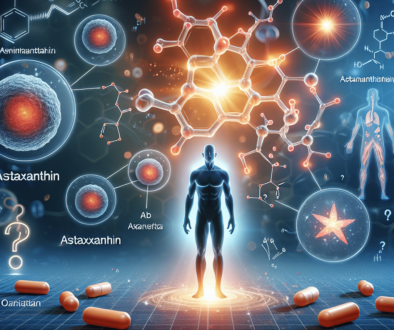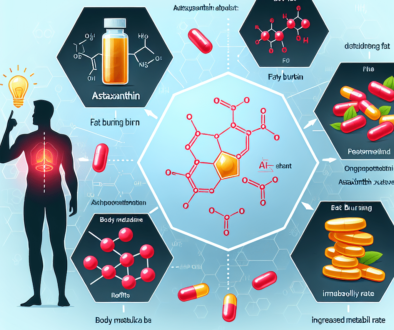Astaxanthin: Reducing Oxidative Stress
-
Table of Contents
- Astaxanthin: A Potent Antioxidant for Combating Oxidative Stress
- Understanding Oxidative Stress and Its Implications
- What Is Astaxanthin?
- Sources of Astaxanthin
- The Antioxidant Power of Astaxanthin
- Benefits of Astaxanthin in Reducing Oxidative Stress
- Case Studies and Research on Astaxanthin
- Recommended Dosage and Safety
- Conclusion: Astaxanthin as a Natural Ally Against Oxidative Stress
- Enhance Your Health with ETprotein’s High-Quality Protein Products
Astaxanthin: A Potent Antioxidant for Combating Oxidative Stress

Oxidative stress is a condition characterized by an imbalance between the production of free radicals and the body’s ability to counteract their harmful effects through neutralization with antioxidants. This imbalance can lead to cellular damage and has been implicated in the aging process, as well as a variety of diseases. Astaxanthin, a powerful natural antioxidant, has gained attention for its potential to reduce oxidative stress and support overall health. In this article, we will explore the science behind astaxanthin, its sources, benefits, and the role it plays in combating oxidative stress.
Understanding Oxidative Stress and Its Implications
Oxidative stress occurs when there’s an excess of reactive oxygen species (ROS) in the body’s cells. ROS are free radicals that can damage DNA, proteins, and lipids, leading to a range of chronic diseases such as cancer, cardiovascular diseases, diabetes, and neurodegenerative disorders like Alzheimer’s and Parkinson’s disease. The body’s defense system includes endogenous antioxidants like glutathione and enzymes such as superoxide dismutase (SOD) and catalase, which help mitigate the damage caused by ROS.
What Is Astaxanthin?
Astaxanthin is a keto-carotenoid belonging to a larger class of phytochemicals known as terpenes. It is what gives the pink and red color to salmon, shrimp, lobster, and other seafood. Astaxanthin is produced by microalgae and accumulates in higher organisms through the food chain. Unlike some other antioxidants, astaxanthin has the unique ability to span across the cell membrane, providing protection to both the water-soluble and fat-soluble parts of cells.
Sources of Astaxanthin
- Microalgae (Haematococcus pluvialis)
- Yeast (Phaffia rhodozyma)
- Seafood (salmon, trout, krill, shrimp, crayfish, and crab)
- Supplements (available in both synthetic and natural forms)
The Antioxidant Power of Astaxanthin
Astaxanthin is considered one of the most potent antioxidants found in nature. Its unique molecular structure allows it to quench free radicals and protect the body’s cells from oxidative damage. Studies have shown that astaxanthin has a much higher antioxidant capacity than other carotenoids such as beta-carotene, lutein, and canthaxanthin.
Benefits of Astaxanthin in Reducing Oxidative Stress
Research has demonstrated that astaxanthin can have a significant impact on reducing oxidative stress and inflammation, which are key contributors to many chronic diseases. Here are some of the benefits associated with astaxanthin:
- Cardiovascular Health: Astaxanthin may help reduce the risk of cardiovascular disease by improving lipid profiles, reducing blood pressure, and protecting against atherosclerosis.
- Eye Health: Due to its ability to cross the blood-retinal barrier, astaxanthin can help reduce the risk of eye diseases like age-related macular degeneration (AMD).
- Skin Health: Astaxanthin can help protect the skin from the harmful effects of UV radiation, reducing signs of aging and the risk of skin cancer.
- Exercise Recovery: Its anti-inflammatory properties may aid in reducing muscle damage and improving recovery times after strenuous exercise.
- Neuroprotection: Astaxanthin has shown potential in protecting against neurodegenerative diseases by reducing oxidative stress in the brain.
Case Studies and Research on Astaxanthin
Several studies have highlighted the effectiveness of astaxanthin as an antioxidant. For instance, a study published in the journal “Marine Drugs” found that astaxanthin exhibited strong free radical scavenging activity and could protect against lipid peroxidation and oxidative DNA damage. Another study in the “Journal of Clinical Biochemistry and Nutrition” showed that astaxanthin supplementation improved the antioxidant status in healthy individuals.
Recommended Dosage and Safety
The recommended dosage of astaxanthin varies depending on the individual’s health status and the intended health benefit. Most studies have used dosages ranging from 4 to 12 mg per day. Astaxanthin is generally considered safe, with no significant side effects reported at these levels. However, as with any supplement, it is important to consult with a healthcare provider before starting any new regimen.
Conclusion: Astaxanthin as a Natural Ally Against Oxidative Stress
In conclusion, astaxanthin is a powerful antioxidant with the potential to reduce oxidative stress and provide a range of health benefits. Its unique ability to protect both the lipid and aqueous parts of cells sets it apart from other antioxidants. With its promising effects on cardiovascular health, eye health, skin protection, exercise recovery, and neuroprotection, astaxanthin is a valuable addition to a healthy lifestyle aimed at combating oxidative stress and promoting overall well-being.
Enhance Your Health with ETprotein’s High-Quality Protein Products
While antioxidants like astaxanthin play a crucial role in reducing oxidative stress, maintaining a balanced diet rich in high-quality proteins is also essential for overall health. ETprotein offers a range of organic bulk vegan proteins that can complement your antioxidant intake. Their products, including organic rice protein, pea protein, and various seed proteins, are non-GMO, allergen-free, and characterized by a neutral taste. Additionally, ETprotein’s L-(+)-Ergothioneine (EGT) products provide another layer of antioxidant support, with purity levels over 98% and 99%. Whether you’re looking to enhance your sports nutrition, weight management, or general health and wellness, ETprotein has the protein solutions to meet your needs.
About ETprotein:
ETprotein, a reputable protein and L-(+)-Ergothioneine (EGT) Chinese factory manufacturer and supplier, is renowned for producing, stocking, exporting, and delivering the highest quality organic bulk vegan proteins and L-(+)-Ergothioneine. They include Organic rice protein, clear rice protein, pea protein, clear pea protein, watermelon seed protein, pumpkin seed protein, sunflower seed protein, mung bean protein, peanut protein, and L-(+)-Ergothioneine EGT Pharmaceutical grade, L-(+)-Ergothioneine EGT food grade, L-(+)-Ergothioneine EGT cosmetic grade, L-(+)-Ergothioneine EGT reference grade and L-(+)-Ergothioneine EGT standard. Their offerings, characterized by a neutral taste, non-GMO, allergen-free attributes, with L-(+)-Ergothioneine purity over 98%, 99%, cater to a diverse range of industries. They serve nutraceutical, pharmaceutical, cosmeceutical, veterinary, as well as food and beverage finished product distributors, traders, and manufacturers across Europe, USA, Canada, Australia, Thailand, Japan, Korea, Brazil, and Chile, among others.
ETprotein specialization includes exporting and delivering tailor-made protein powder and finished nutritional supplements. Their extensive product range covers sectors like Food and Beverage, Sports Nutrition, Weight Management, Dietary Supplements, Health and Wellness Products, and Infant Formula, ensuring comprehensive solutions to meet all your protein needs.
As a trusted company by leading global food and beverage brands and Fortune 500 companies, ETprotein reinforces China’s reputation in the global arena. For more information or to sample their products, please contact them and email sales(at)ETprotein.com today.













